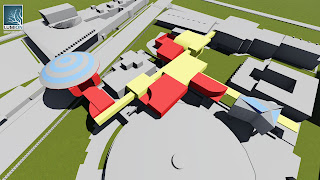Tuesday, 31 May 2016
Tuesday, 24 May 2016
Tuesday, 17 May 2016
EXP3 Week1- Mash up
Theory
Connection, Repetition, Urban Context
Architecture is the physical
language of city and community building. Architecture Connected expands what is possible with people,
architecture and technology. The spaces we design encourage social interaction
and collaboration, inviting people to interact with each other in innovative
and meaningful ways. Architecture
projects need to be perceived as part of implementing an urban design project
which entails gathering insights into urban fabric and how people use urban
spaces. Connected
architecture engage
students in the classroom and around the world. Body gestures and voice
commands enhance communication and presentation tools, increasing efficiency,
collaboration and interaction. The role of a Designer is to work on many scales,
thoughtfully designing public places and spaces, to build on the unique local
character and the best qualities of the forms inherent in that geographic
region. The orderly repetition or regular alternation of optical similarities or equalities dictates the rhythm of the plastic organization.It was found that the structural resemblance dominates these differences. Repetition in any form of rhythm—as much in music as in architecture—is an extremely simple principle of composition which tends to give a sense of coherence.“Symmetry, or the use of repeated and balanced forms, is essential. Where glass appears on the one side, there must be a glass on the other, of the same dimensions and in a frame of the same shape.”ARCHITECTURE AND CONTEXT, California Polytechnic State University, San Luis Obispo College of Architecture & Environmental Design Prof. Sharad Atre’, FIFTH YEAR . ARCHITECTURAL DESIGN & THESIS (assess on 15th May, 2016)
http://www.calpoly.edu/~arch/program/fifthyr/atre.pdf
Architecture connected,
http://architectureconnected.com/
Repetition-Compulsion: World-Historical Rhythms in Architecture, Ross Wolfe, April 2014, Vol.54
http://www.e-flux.com/journal/repetition-compulsion-world-historical-rhythms-in-architecture/
Tuesday, 3 May 2016
EXP2 Final Submission
Two Cencept
Opposite of heavy and lightEyck's architecture followed the concept of the " Opposite of heavy and light" which illustrated by alternating the use of material and the weight of the blocks. The contrast of the heavy and light will betray the architecture and give a feeling of larger space.
Intersecting planed and created space
Peter Eisenman ultilizes the intersection of blocks in order to create more available space which represents more sustainable of the building. Those fragmentary creations are good example of 1+1=3.
Electroliquid Aggregation
The light rail stop is expected to construct through deconstruction to create space. The intersecting blocks will naturally create more available space for the transportation and the public which enhance the sustainability of the light rail stop. The contrast of the heavy curvilinear base with the light supporting column will highlight the functional area.
http://xashiruyi2014.blogspot.com.au/2016/04/exp2-axonometric-sketch-and-lumion-modle.html
6 parallel projection
http://xashiruyi2014.blogspot.com.au/2016/04/interconnection.html
Peter Eisenman ultilizes the intersection of blocks in order to create more available space which represents more sustainable of the building. Those fragmentary creations are good example of 1+1=3.
Electroliquid Aggregation
The light rail stop is expected to construct through deconstruction to create space. The intersecting blocks will naturally create more available space for the transportation and the public which enhance the sustainability of the light rail stop. The contrast of the heavy curvilinear base with the light supporting column will highlight the functional area.
18 Sketch Axonometric
12 axonometrichttp://xashiruyi2014.blogspot.com.au/2016/04/exp2-axonometric-sketch-and-lumion-modle.html
6 parallel projection
http://xashiruyi2014.blogspot.com.au/2016/04/interconnection.html
36 Custom Texture
http://xashiruyi2014.blogspot.com.au/2016/04/exp2-36-texture.htmlImages captured in lumion
Texture used in model
Light
Lumion File
3d warehouse
Subscribe to:
Comments (Atom)


























